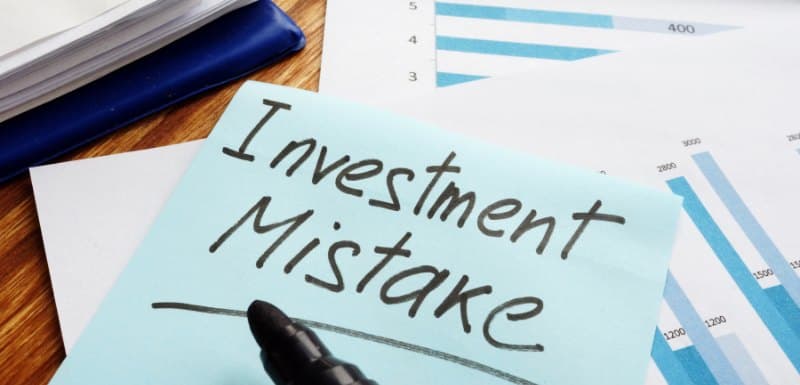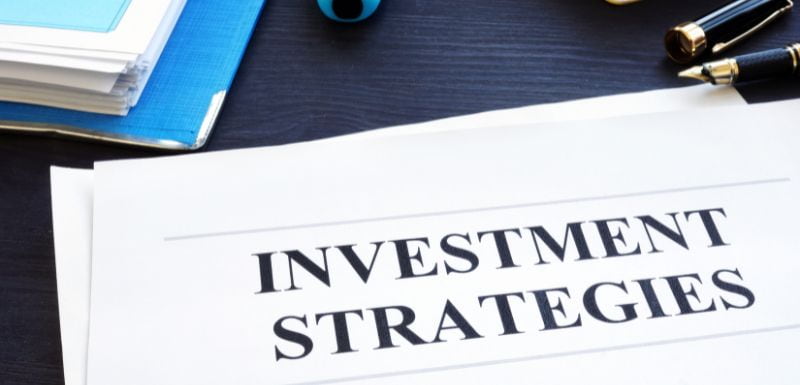10 Investing Mistakes That You Should Avoid

Financial planning is a lifelong journey that starts from the moment you start earning. In this long journey, investors may make some mistakes. However, we should all learn from our investing mistakes to ensure our financial planning journey proceeds smoothly. In this article, we will discuss 10 investing mistakes that you should avoid.
10 Investing Mistakes That You Should Avoid
1) Investing Without a Financial Plan and Not Mapping Investments to Financial Goals
Before we set out on a vacation, we fix the destination, the route to be taken, the mode of transport, the itinerary, etc. Travelling without these details will lead to total chaos and disappointment. The same goes for investing. Before you start investing, you should consult an investment expert.
They can help you list your financial goals, make a financial plan, recommend the appropriate financial products, map them to your financial goals, review the progress regularly, and handhold you till the financial goals are achieved.
What happens when you invest without a financial plan and don’t map your investments to your financial goals? You don’t know your objective of investing, how much you need to invest, how much you need to accumulate, when you will need the money, etc. Such unplanned and unsystematic investments will lead you nowhere.
Having a financial plan and investments mapped to financial goals will give you clarity on your investment objectives. You will be able to invest regularly in a systematic way and stay focused till you achieve your financial goals.
Action Point: Always have a financial plan with financial goals defined and investments mapped to goals.
2) Building a Concentrated Investment Portfolio
Building a concentrated investment portfolio is the next mistake that you should avoid. Instead, you should always build a diversified investment portfolio. Your portfolio should be spread across asset classes like equity (for growth and wealth creation), fixed income (for stability), gold (for a hedge against inflation), etc.
A well-diversified investment portfolio reduces the concentration risk and gives better risk-adjusted returns. Along with diversifying across asset classes, you should diversify within asset classes. For example, within the equity asset class, your portfolio should have a mix of large, mid, small, and micro-cap mutual fund schemes.
Action Point: Build an investment portfolio diversified across asset classes and within asset classes.
3) Not Investing or Investing Less in Equity for Long-Term Goals
Some investors avoid equity as they have a moderate or conservative risk profile. That may be true for short and medium-term financial goals. However, for long-term financial goals, where the investment time horizon is beyond seven years, you should have some equity exposure.
Equities have given inflation-beating high returns in the long run and created wealth for investors. India is one of the fastest-growing economies in the world. It is in the midst of transitioning from a developing economy to a developed economy. During this economic growth phase, stock markets are expected to do well. Hence, you should participate in this wealth creation journey through equity mutual funds.
Action Point: For long-term goals, invest in equity mutual funds.
4) Having High Return Expectations at All Times
After the Covid-related stock market fall in 2020, in the last four years or so, the markets have not seen any big meaningful fall. In these four years, the Nifty 50 Index has multiplied three times from the lows of around 7,500 levels to around levels of 22,500. As a result, new investors who entered the market in the last four years have started building high return expectations from stock markets at all times.
However, this is an unreasonable expectation to have. Stock markets experience bull and bear phases regularly and undergo corrections from time to time. Some corrections may be bigger, ranging from 20% to 50%, and may last for a long time. Hence, investors should lower their return expectations from stock markets. Markets never move in a linear direction.
Action Point: Be prepared for the stock market bull and bear phases. Have reasonable return expectations.
5) Letting Greed and Fear Emotions Influence Your Investment Decisions
In the case of many investors, their emotions influence their investment decisions. During bull markets, the greed emotion takes over, and during bear markets, the fear emotion drives investment decisions. However, you should keep aside emotions and continue with your investments, irrespective of whether the market is in a bull or bear phase.
You should invest through the systematic investment plan (SIP) route. Invest regularly in a disciplined manner. Stay focused on your financial goals rather than getting influenced by emotions that affect your investment decisions.
Action Point: While investing, keep aside emotions, follow the investment process and stay focused.
6) Investing With the Primary Purpose of Saving Taxes
Some people invest solely with the purpose of saving taxes. As a result, they may end up investing in financial products that may not be appropriate as per their investment needs. They usually end up making lumpsum investments as they invest at the last minute to save tax. That is not the most appropriate way to invest.
You should always invest towards your financial goals, and tax planning should be a part of it. While investing towards your financial goals, you should select financial products that are tax-efficient. Make the most of the various tax exemptions and deductions available under the various sections of the Income Tax Act.
Action Point: Make tax planning a part of financial planning rather than investing solely for saving tax.
7) Not Starting the Investment Journey Early
You should start investing early, preferably as soon as you start earning. The sooner you start, the more time your investments will get to benefit from the power of compounding. In the long run, the power of compounding can help you grow your money and create wealth. The earlier you start, the more money you will accumulate by retirement.
Let us understand how starting investments early can help you with an example. Four investors start investing in the same equity scheme but at different times. They start a SIP of Rs. 10,000 per month (Rs. 1,20,000 annually). The equity fund gives a return of 12% CAGR. Here is how much they will accumulate.
|
Investor |
Investment tenure |
Annual investment |
Expected Rate of Return |
Amount Accumulated |
|
A starts investing at age 25 years |
35 years |
Rs. 1,20,000 |
12% CAGR |
Rs. 5,80,15,574 |
|
B starts investing at age 30 years |
30 years |
Rs. 1,20,000 |
12% CAGR |
Rs. 3,24,35,113 |
|
C starts investing at age 35 years |
25 years |
Rs. 1,20,000 |
12% CAGR |
Rs. 1,79,20,072 |
|
D starts investing at age 40 years |
20 years |
Rs. 1,20,000 |
12% CAGR |
Rs. 96,83,848 |
The above table shows the difference in the amount accumulated between A and B is a massive Rs. 2.55 crores. A delay of every five years leads to a massive difference in the amount accumulated. Hence, you should start investing early.
Action Point: Start investing as soon as you start earning to build a good corpus.
8) Attempting to Time the Markets
Some investors try to time the market in an attempt to buy at the bottom when the market falls and sell at the peak when the market rises. However, even many market experts fail to catch the market bottom and peak. Some investors wait for a correction to buy, and the market keeps rising. As a result, they miss the gains. Similarly, some investors sell, hoping the market has peaked, and the market keeps rising. As a result, they end up selling early, and miss the gains.
An investor should start investing and continue with the investments irrespective of the market levels. You should focus on your financial goals rather than trying to time the market peak and bottom. As long as you achieve your financial goals with regular investments, you don’t need to time the markets.
Action Point: Don’t try to time the market. Focus on your financial goals, and continue with your investments till you achieve your goals.
9) Not Reviewing the Investment Portfolio Regularly
Some investors start investing and just continue with the same portfolio. You should review your investment portfolio regularly, at least once in six months or a year. The review gives you an insight into whether the investments are performing as expected. If some financial product is consistently underperforming, you may replace it with an appropriate product.
If the taxation of a financial product has changed, during the review, you can check whether any action is required from your side. If a new financial product has been introduced, during the review, you can analyse whether you need to include it in your portfolio.
Action Point: Review your investment portfolio once every six months or a year to track the progress.
10) Not Taking Professional Advice
These days, some Do It Yourself (DIY) platforms have emerged. If you have a good knowledge of financial products and have been investing for a long time, you may consider going with these platforms. However, if you are new to investing or have started investing recently, you should take professional advice.
An investment expert can guide you at every step of investing, right from making a financial plan till your financial goals are achieved.
Action Point: Work with a qualified and experienced investment expert throughout your financial planning journey.
Work With an Investment Expert to Avoid Mistakes
The financial planning journey is a long journey that starts when you start earning and continues throughout your life. In this long journey, you may make some mistakes if you travel alone. While some mistakes will be small and harmless, some big mistakes can cause substantial financial damage. Hence, working with an investment expert right from the start is a good idea to avoid mistakes. When you avoid mistakes, your financial planning journey will be smooth, and you will be able to achieve all your financial goals.
Your Investing Experts
Relevant Articles
9 Personal Finance Mistakes to Avoid
You must have heard the famous phrase: "Knowing is half the battle". It signifies the importance of being informed. The other half is the application of knowledge. Unknowingly, people do make mistakes and learn from them. However, learning from personal finance mistakes can come at a cost and derail or push you back in your financial planning journey. Hence, it is best to be aware of these money mistakes and avoid them so your financial planning journey can be smooth. In this article, we will discuss some common financial mistakes to avoid.
Steps to Construct a Great Investment Portfolio – A Guide for Smart Investors
Living in today’s information age has its pros and cons. You have your broker, family members, friends, colleagues, and others giving you friendly investment tips. You also have TV channels, newspapers, magazines, social media and other internet channels bombarding you with investment recommendations/tips.
Investment Strategies: Growth and Value Investing
The stock markets go through various business/economic cycles of ups and downs from time to time. During these phases, various stocks do well based on certain criteria. For example, growth/momentum stocks usually do well during bull markets, and value stocks do well during bear markets. The investment strategy that you follow influences your returns. In this article, we will understand the various investment strategies and which one you should follow to maximise your portfolio returns.
.png)


